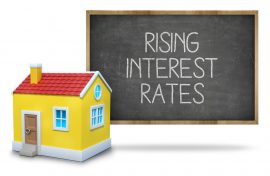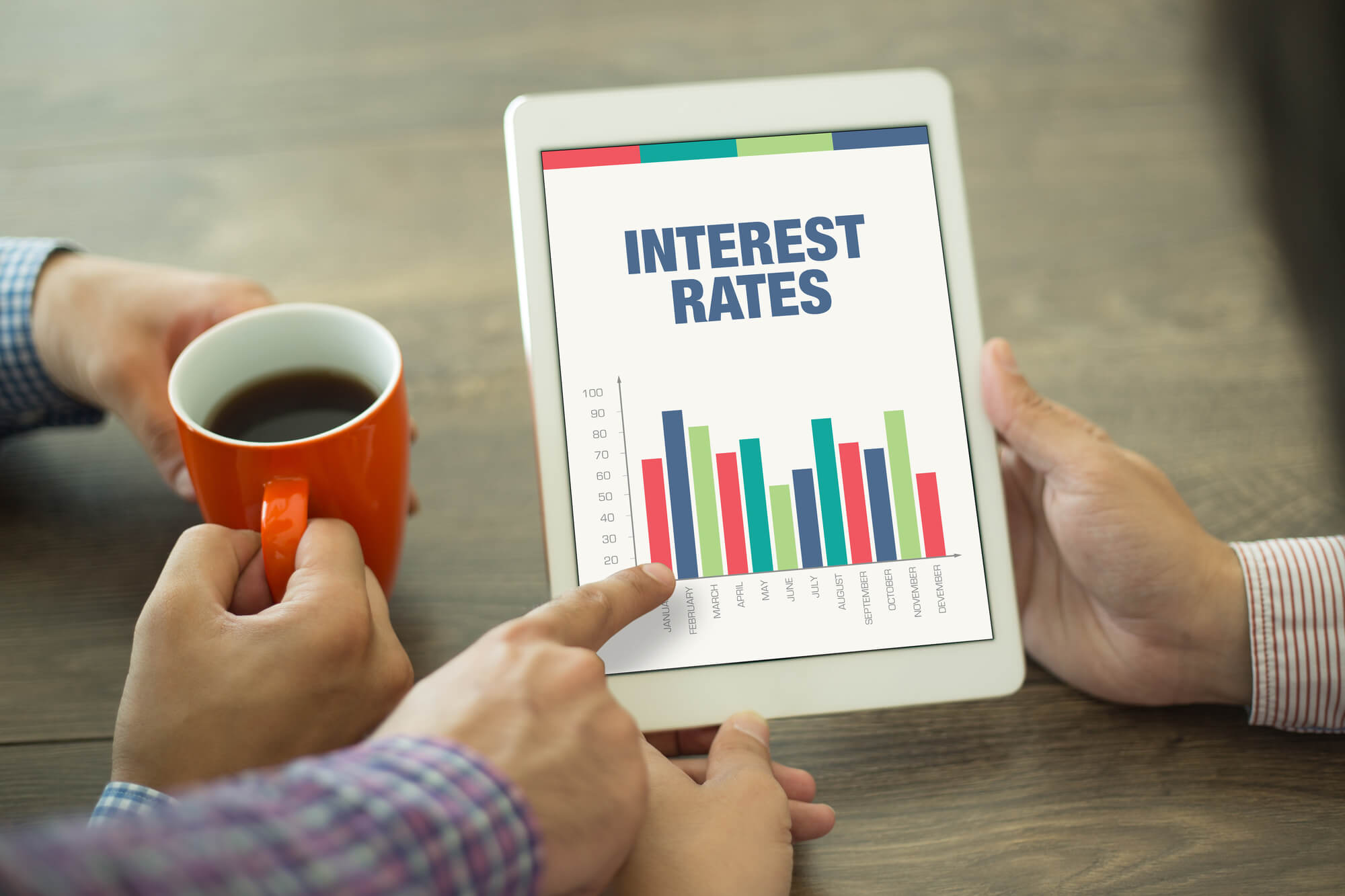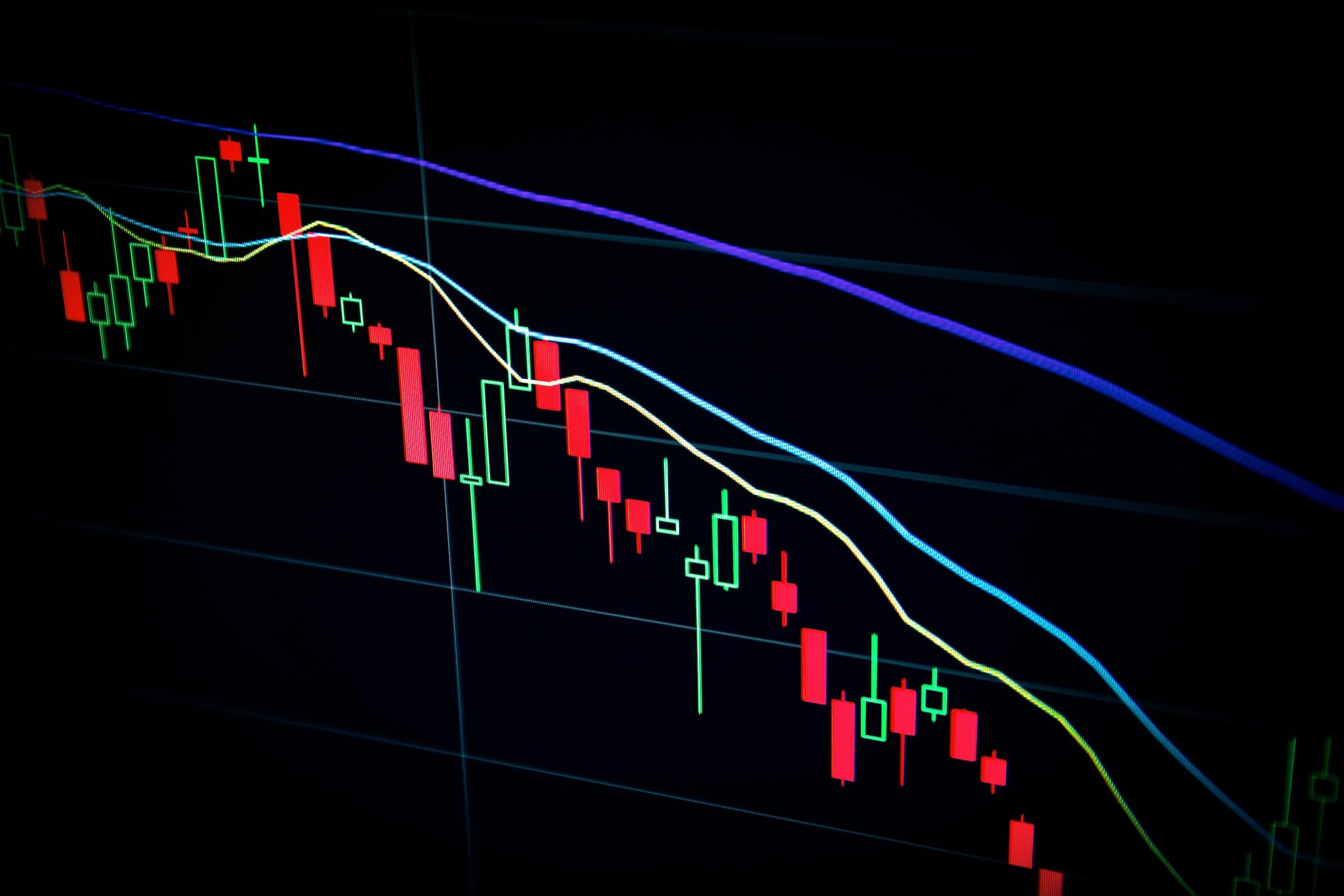
With inflation rising to unprecedented levels, the U.S. Federal Reserve is pushing back by raising the interest rate. The strategy is simple: higher interest rates make it harder for consumers to borrow money for large purchases. Higher interest rates are expected to bring prices back down by lowering consumer demand.
But what happens to stocks when interest rates rise?
Prevailing wisdom dictates that rising interest rates bring on a steep drop in stock prices. But that’s not always the case. Here’s how interest rates impact the stock market.

Do Rising Interest Rates Cause Stock Prices to Drop?
What happens to stocks when interest rates rise? According to JPMorgan, high interest rates in 2022 are preventing the stock market from experiencing a sustained rebound. “As long as central banks raise rates or keep them at current high levels, we believe assets will be rangebound,” JPMorgan said in a November note.
But the exact impact of interest rates is, at best, a mixed picture.
Remember: the stock market is not a monolith. Not every sector experiences the same impact from rising interest rates. In a 2018 issue of the Journal of Investing, Andrew Berkin reviews the data and concludes that there is no “historical evidence” that “rising interest rates will negatively impact equity returns.”
It’s true that rising interest rates are impacting the stock market. But every sector is hit a bit differently, and that may present investors with a unique strategy when interest rates rise.
How Interest Rates Impact Different Sectors
Interest rates have a disproportionate impact on certain segments of the stock market. Here’s what to expect from some common classifications of stocks.
Growth Stocks (Decline)
High interest rates hit growth stocks the hardest. In fact, high interest rates can potentially cause growth stocks to decline in value at a faster rate than the rest of the market. That’s because the bump in the interest rate influences the value of the company’s cash flow. When cash flows freely, the company drops in value.
Tech Stocks (Decline)
A high interest rate stifles growth in the technology sector, causing stock prices to fall. For one thing, it’s harder for consumers to make major purchases like computers, phones, etc. But interest rates can also discourage tech companies from investing in new initiatives or product lines. Together, these factors cause a drop in value.
Financial Stocks (Increase)
Banks and other financial providers actually do better when the interest rate rises. This only makes sense: banks lend money in order to make a profit. As interest rates rise, so do profits. This means that banks, mortgage lenders, student loan companies, and other types of lending services can thrive as interest rates climb.
Commodities (Increase)
Many investors see commodities as inflation-hedging assets. So while interest rates don’t directly influence the price of commodities, high interest rates typically occur during periods of high inflation. In other words, interest rates don’t cause commodity prices to rise, but the broader economic landscape drives more interest in these assets, causing a boost in their price.
Utility and Energy Stocks (Decrease)
Utility and energy companies often borrow heavily to maintain their operations. Rising interest rates therefore inflate overhead costs, which translates into lower profits. High interest rates can cause utility and energy stocks to drop.
Consumer Staples Stocks (Neutral)
Consumer staples stocks represent companies that manufacture or distribute products that consumers buy regardless of the economy. These include food, beverages, cosmetics, toiletries, and healthcare products. Interest rates don’t have much influence over these companies because customers will continue to buy the products they need.

Why Are Growth Stocks Sensitive to Interest Rates?
Every sector experiences a different level of impact from rising interest rates. But why are growth stocks sensitive to interest rates? There are three reasons.
Limited Access to Financing
Growth stocks earn their name from their capacity for rapid expansion. But growth takes money, and high interest rates can limit access to funding for these companies. High interest rates stifle growth, which reduces the value of growth stocks.
Lower Present Value
High interest rates cause a reduction in the company’s discounted cash flow (DCF). This means that the company will have less money to work with at any given point, which also limits growth potential.
Declining Investor Sentiment
Investors tend to look less favorably at growth stocks when interest rates are high. This can have a bit of a cyclical effect. As investors pull back, the company has less working capital, which lowers the value of the stock. This decline causes more investors to pull back, and the cycle continues until the market restabilizes.
What Are the Best Stocks to Buy When Interest Rates Rise?
Keep in mind that there won’t always be an announcement behind rising interest rates. Under most circumstances, you can’t count on rising interest rates to influence your investment choices. But once interest rates increase, you can adapt your investing strategy to match the new economic climate.
Here are the best stocks to buy when interest rates rise.
Consumer Staples Stocks
Consumer staples can include food manufacturers, grocery chains, and more. While rising interest rates might cause shoppers to be more frugal, they’ll still make the same general purchasing decisions as they did before the rate hike. Consumer staples stocks can therefore bring some stability to your portfolio, or even find opportunities for growth.
Costco (COST), for example, flourishes in the present economy as consumers seek out savings opportunities. Such consumer spending habits can make Costco a solid choice for your portfolio.
Large-Cap Stocks
When interest rates rise, your best bet is to focus on large, stable stocks. Large-cap stocks represent companies with a market capitalization of over $10 million. This means that these companies aren’t as easily influenced by things like inflation or skyrocketing interest rates.
Large-cap stocks can bring stability to your investment portfolio. You may even find surprising deals during an economic downturn, so now may be a good time to look for bargains.
These large stocks can also be used to hedge your investments. If you decide to invest in a risky startup company, you can also invest in a large-cap stock to balance your portfolio.
Financial Stocks
If you want to see your money grow as interest rates rise, your best bet is to invest in the financial sector. Banks and lenders only stand to profit off of high interest rates, so the value of these companies is sure to increase.
For example, Bank of America (BAC) is poised to see an increase in profits thanks to record-level interest rates. But you might also consider Navient (NAVI), a leading provider of student loans. Since college enrollment remains high, you can expect these sorts of companies to continue bringing in substantial profits.
Cybersecurity Stocks
Admittedly, the tech sector can be something of a gamble, since these companies won’t have the same level of access to financing. But cybersecurity companies are in demand as geopolitical tensions continue to mount.
Consider Palo Alto Networks (PANW). The company is a multinational provider of cybersecurity services, so the value of the company’s stock is not solely tied to the U.S. economy. This could make it a great choice for your next investment.

Looking for Stock Picks?
Gorilla Trades members get access to great content that can help them in any economic climate. By joining, you’ll be able to browse additional resources and use advanced tools to maximize your investing decisions. Sign up today and you’ll receive 30 days of free stock alerts delivered straight to your inbox.
